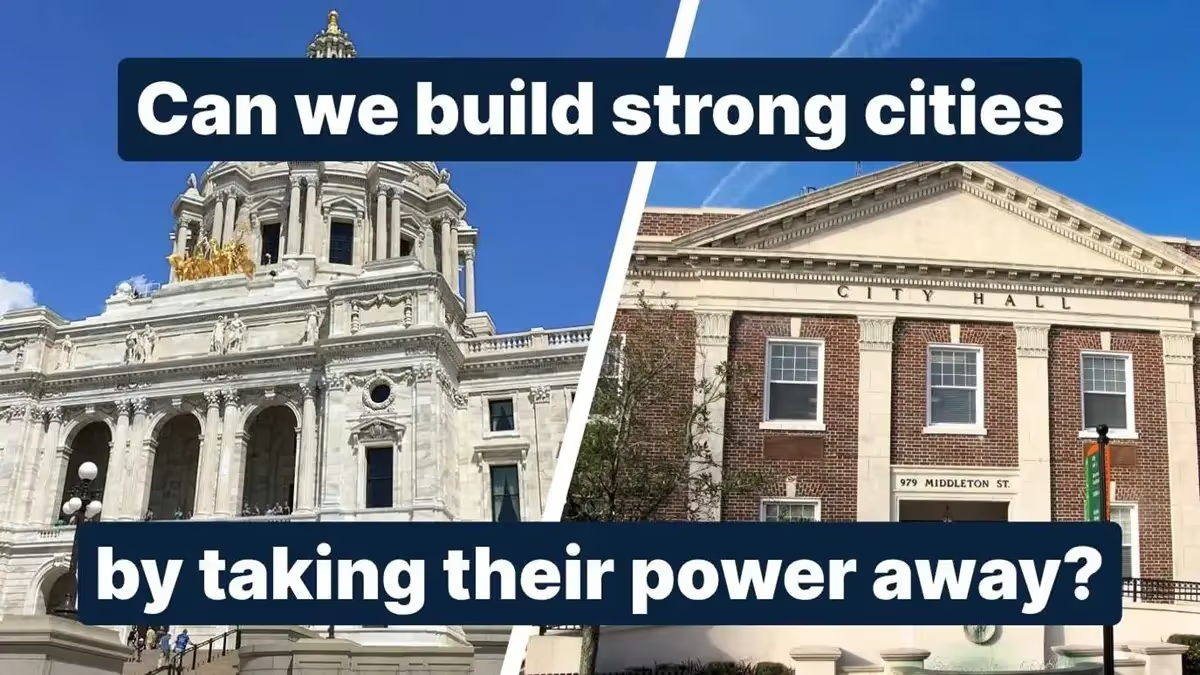I’m grateful to Laura Foote and Jeff Fong for their open letter, Strong Towns Need Strong States. It was thoughtful, respectful, and earnest — an especially hopeful mix for housing discourse. We agree on far more than we disagree, and even where our views diverge, I see in their critique a sincere desire to get things right.
This is the kind of good-faith disagreement I think our movement needs more of. We all want to see more housing, greater access, and more prosperous, welcoming communities. The question is: How do we get there? And just as important: Who decides what “there” looks like?
At Strong Towns, we don’t defend the status quo. Quite the opposite. We’re deeply critical of how most cities function today. Zoning codes that prioritize fragility over adaptability. Bureaucracies that impose needless friction on even modest development. Decision-making processes that are captured by narrow interests. None of that is defensible.
But just because cities aren’t working the way they should doesn’t mean they’re the problem. In fact, I believe cities are still our best hope for real reform. At its core, the Strong Towns project is about changing how cities function, reorienting them away from vertical dependence on outside capital and toward horizontal alignment with the needs and capacities of their own residents. That shift isn’t just bureaucratic; it’s cultural. It’s about building cities that act with their people, not merely on their behalf.
This is where we diverge from some of our pro-housing colleagues: not on the need for reform, but on the path to reform. I worry that the emerging consensus around state preemption — while understandable — risks repeating the very pattern that got us into this mess: a top-down system that promises abundance but, in the process, disempowers the very communities it seeks to help.
After all, we’ve seen this before. Again and again, tools originally meant to solve local problems — tools like comprehensive planning, the 30-year mortgage, even the credit score — are absorbed into centralized systems and gradually repurposed to serve other priorities. What begins as community problem-solving becomes rigid, exclusionary, and sometimes predatory. The tool becomes detached from the people it was meant to serve. The problem isn’t always the tool itself, but the way the state directs, misdirects, and rewards its use.
The open letter does a thoughtful job of summarizing the debate. But I want to gently correct how it characterizes my position. They suggest I argue that “state governments ought not to try to override local regulations.” That’s not quite right. My concern isn’t with every act of state intervention. After all, I recently supported the elimination of all parking minimums in Minnesota. My concern is with the pattern of relying on state mandates as the primary mechanism for change.
Here’s how I would restate my actual position:
- State-level preemption risks running into knowledge problems, especially when a policymaker far removed from a community imposes global rules for everyone without respecting nuanced local conditions that vary city to city, neighborhood to neighborhood.
- Reform should begin at the local level, where tradeoffs are lived and visible.
- The primary role of state governments should be to support, resource, and equip local governments as they struggle to solve problems, not to override them by default.
At Strong Towns, we’re not categorically opposed to preemption. In some cases, it can help get stuck systems moving again, especially when it removes arbitrary constraints and opens up possibilities for incremental growth. That’s why we’ve supported state-level reforms like eliminating parking minimums, legalizing backyard cottages, allowing duplexes in single-family zones, and requiring zoning codes to accommodate continual neighborhood maturing everywhere. These kinds of preemptions aren’t about centralizing power; they’re about lending assistance to cities that are struggling, not smashing the small reserves of agency that cities still have left.
These distinctions matter. The difference between a state acting as a partner and a state acting as a substitute is not just technical. For Strong Towns, it’s foundational. When states bypass local governance entirely, they don’t build capacity. They reveal, and often reinforce, its absence.
The temptation is to treat local governments as the lowest level in a hierarchy of governments, tasked merely with implementing state and federal mandates. This view often ignores that many local powers, including zoning, have deep roots in community governance long before they were formally enabled by state policy. Local government is properly understood as the top level of civic organization for people who live and work in a place. When we reduce cities to policy delivery mechanisms for distant bureaucracies, we get bad local government. If we want cities to function, we have to allow them — and expect them — to govern well.
As housing advocates, we have to help them get there, not kick them to the curb. We need local government to work; there is no way around that.
I understand the feeling that some places may never change. In communities with deep-rooted privilege and political inertia, it can seem that no amount of bottom-up organizing or dialogue will shift the balance on affordable housing. That’s a real problem, and I don’t want to minimize it. Resistance to adding housing is common, but it’s not universal. There are cities — many of them — that are showing leadership, taking risks, and making progress. We should be nurturing and celebrating that leadership, not stifling it. A preemption-first approach may restrain the worst actors, but it can also weaken the very cities most capable of leading by example.
Also, state preemption is not a silver bullet or a shortcut that gets around local resistance. We may win some policy victories through state mandates, but if we fail to reform the culture and capacity of cities themselves, those wins won’t endure. They’ll be bypassed, undercut, or slowly undone. Not just in policy, but in spirit. This is something we’ve also seen time and again. Shortcuts have a way of getting us lost.
I’ve also been troubled by a framing I often hear — sometimes implied, sometimes explicit — of the state and the individual teaming up against local government. This framing treats city hall as an obstacle to be overcome, rather than a forum where we work together to solve problems. I understand the frustration many people feel toward their local government, but stripping away its role and authority doesn’t fix those frustrations. It cements them. It leaves local government permanently weaker, less capable of solving problems, and more likely to be the very obstacle people already fear.
There’s an assertion common among many housing advocates that cities are controlled by a small collection of selfish people, homeowners who care only about their own property values and will do whatever it takes to protect them. That may be true in some cases, but as a generalization, it’s a gross oversimplification of a complex human reality. I don’t believe, for example, that the typical senior citizen is indifferent to the fact that their grandchild can’t afford a home. Most people aren’t heartless. They’re often scared, uncertain, or unclear about the tradeoffs being asked of them.
Rhetoric that paints our neighbors as villains in a political drama may win points in a partisan campaign, but it’s corrosive to civic life. It divides us. It flattens the complexity of human motivations into binaries: good vs. bad, hero vs. obstacle. I hate what that does to our discourse. I hate what it does to our relationships. And I hate what it does to our souls.
The city is not the enemy of the person. It can’t be. If we abandon the idea that local government can express the will and wisdom of a community — not perfectly, not always, but meaningfully — we lose something essential. Not just about governance, but about belonging, responsibility, and citizenship.
This is where some parts of the pro-housing movement present both an opportunity and a risk. The opportunity is to channel growing political momentum into meaningful change. The risk is to let urgency justify expediency.
Yes, we need housing now. But if we want reform that endures — surviving political shifts, taking root, and growing — we need more than top-down mandates. We need cities that are capable of governing themselves well, that can understand their challenges, weigh competing values, and act in the public interest without constant micromanagement from above.
I’ll admit that this kind of local governance doesn’t exist in most places today. But it won’t magically emerge by displacing it, either. It has to be cultivated. That’s the work Strong Towns is committed to. Patiently, persistently, and, yes, imperfectly. We’re not just trying to change policies. We’re trying to change the culture and capacity of local decision-making so cities can become what they are at their best: engines of adaptation, connection, and strength.
That doesn’t mean there’s no role for state policy changes, or that all preemption is always wrong. But if we do reluctantly reach for the preemption tool, we should use it like a scalpel, not a scythe, and acknowledge the many failures it represents:
- The failure to build capacity.
- The failure to cultivate trust between communities and their governments.
- The failure to develop local leaders who are able to navigate difficult tradeoffs with wisdom.
- The failure to equip cities to meet modern challenges without outsourcing their autonomy.
Preemption may offer temporary relief, but it’s also generally a signal that we have not invested in the long, patient work of making our cities stronger. We must be wary of systematically weakening our cities for short-term expediency. That, more than anything, is the deeper source of our pain.
To everyone working for housing that is more broadly affordable, even if we differ on tactics, I want to say: I see you. Let’s keep talking. Let’s keep wrestling. Let’s keep building.





